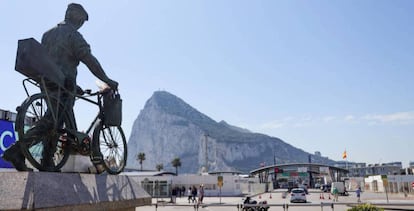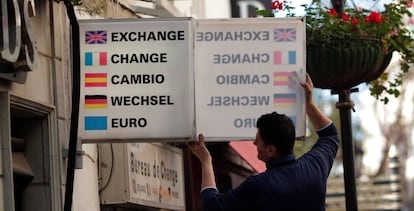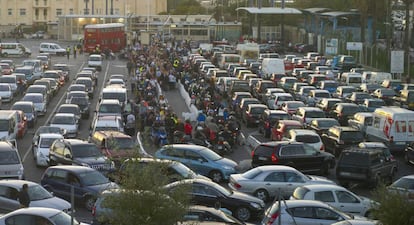Gibraltar seeks to keep EU ties after Brexit transition ends
The British Overseas Territory is not ruling out joining the customs union or the Schengen Area, but its future relationship depends on the UK and Spain

The Brexit transition period will be over on January 1, and that means that Gibraltar, just like the United Kingdom, will be left out of the European Single Market.
While London is facing the prospect with relative calm, alarm bells are going off in the British Overseas Territory, which is located at the southern tip of the Iberian peninsula. Ceded to Britain in 1713 during the War of Spanish Succession, Gibraltar has been a continuing source of friction between Madrid and London.
Gibraltarian authorities are seeking a formula that will allow the small territory to retain ties to the European Union, after its approximately 34,000 residents overwhelmingly voted to remain in the EU at the 2016 Brexit referendum.
Sources consulted by this newspaper said that one of the options on the table is having Gibraltar join, for the first time in the territory’s history, either the EU customs union or the Schengen passport-free area. “This possibility cannot be ruled out,” said one source about an option that would represent the first time in over 300 years that Gibraltar and the UK have taken separate roads.
The government of Pedro Sánchez is prepared to discuss the new relationship without addressing the issue of co-sovereignty
Joining the customs union was the first solution offered by Brussels to solve the problem of Northern Ireland, which could end up with a border separating it from the Republic of Ireland, a EU member. The proposal was vigorously rejected by London on the basis that a different customs system for Northern Ireland would be tantamount to breaking the UK’s unity.
But the idea is making a comeback as a possible solution for Gibraltar, which has a physical border with the EU – the Spanish province of Cádiz lies to the north – and whose economy greatly relies on the single market. Gibraltarian sources noted that following the 2016 Brexit referendum, Chief Minister Fabian Picardo mentioned the possibility that Gibraltar might follow a different path from the UK and join the European customs union or even the Schengen Area, which has abolished border controls for its members.
Gibraltarian sources said that London should not raise objections the way it did with the Irish border: “Northern Ireland is part of the UK, but Gibraltar is a separate jurisdiction; there would be no broken unity.”
Gibraltar could take advantage of the various forms of association with the EU: some territories, such as Monaco, are part of the customs union; others, like Norway, Liechtenstein and Iceland are part of the single market, while all three plus Switzerland are part of Schengen.
Shared prosperity zone

At a meeting with UK officials held in Málaga in June, Spain made an offer on some of the thornier aspects of bilateral relations regarding Gibraltar. Little is known about the contents of this offer, and no reply has been received yet, but Madrid says it wants to create “a shared prosperity zone” for an area where 14,000 workers cross into Gibraltar every day from Spain’s economically depressed Campo de Gibraltar, where the unemployment rate in cities like La Línea de la Concepción is 30%.
For Gibraltar, it is crucial to avoid a similar kind of isolation as when Francisco Franco closed the border in June 1969 and kept it shut for the next 16 years. Although the overseas territory’s economy was not destroyed, as the Spanish dictator had been expecting, its growth potential was hampered. When the border reopened in 1986, it helped drive up Gibraltar’s per capita GDP, which is now one of the highest in the world, thanks in part to an opaque fiscal system.
Besides a strong financial services sector that largely depends on London, “The Rock” as Gibraltar is commonly known, has managed to attract up to 10 million tourists a year, many of whom arrive by land. And up to 40% of its workforce is made up of Spanish workers who commute each day, meaning that any added obstacle at the border could have a serious impact on the local economy.
However, The Rock’s future relationship with the EU does not depend on Gibraltar, but on talks between the UK and Spain. And those are still up in the air. British sources said that the negotiations, which Gibraltarian authorities are a part of, are advancing in a constructive way and that the priority is “maintaining the welfare and prosperity” of the people who live in the area.

London is negotiating with Spain on Gibraltar’s position with regard to the EU, and with Brussels on its own future relationship with the union. So far, everything indicates that the latter talks will end in a bare-bones deal in the best of cases, and in a lack of agreement in the worst-case scenario. For Gibraltar, this would be a terrible blow.
Selective integration into the EU would not only require approval by London but also by Spain, which holds a veto right on any changes to the relationship between Gibraltar and the EU.
The government of Pedro Sánchez, of the Socialist Party (PSOE), is prepared to discuss the new relationship without addressing the issue of co-sovereignty over the territory. But Madrid does want to discuss other matters such as the location of Gibraltar’s airport, built on an area that was not ceded to Great Britain under the 1713 Treaty of Utrecht. And there is also a longstanding dispute over territorial waters.
English version by Susana Urra.
Tu suscripción se está usando en otro dispositivo
¿Quieres añadir otro usuario a tu suscripción?
Si continúas leyendo en este dispositivo, no se podrá leer en el otro.
FlechaTu suscripción se está usando en otro dispositivo y solo puedes acceder a EL PAÍS desde un dispositivo a la vez.
Si quieres compartir tu cuenta, cambia tu suscripción a la modalidad Premium, así podrás añadir otro usuario. Cada uno accederá con su propia cuenta de email, lo que os permitirá personalizar vuestra experiencia en EL PAÍS.
¿Tienes una suscripción de empresa? Accede aquí para contratar más cuentas.
En el caso de no saber quién está usando tu cuenta, te recomendamos cambiar tu contraseña aquí.
Si decides continuar compartiendo tu cuenta, este mensaje se mostrará en tu dispositivo y en el de la otra persona que está usando tu cuenta de forma indefinida, afectando a tu experiencia de lectura. Puedes consultar aquí los términos y condiciones de la suscripción digital.








































